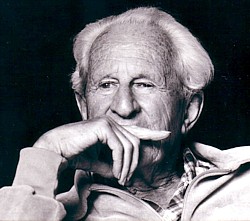
Herbert Marcuse, http://www.marcuse.org/herbert/images/
herbohlbfinger250pxw.jpg
Step into a political philosophy class and there is a good chance you may learn of Herbert Marcuse and his writings in One Dimensional Man where he comments that “people recognize themselves in their commodities; they find their soul in their automobile, hi-fi set, split-level home, kitchen equipment” (Marcuse, 9). Our purchases are no longer just items, they define us and our lives. At times, this may seem to be a bit of a stretch but I challenge you to reflect: how many commodities in your life do you consider a necessity? How many do you feel aid you in defining your life? Chances are, you can name quite a few.
One of my favorite examples of a company exploiting the connection or need for a product is an advertisement from Vodafone, released in 2006. The advertisement seeks, and possibly succeeds, to manipulate viewers into believing that the product, or the brand, is necessary in our lives in order to achieve the happiness that we seek.
The life of the mayfly in the Vodafone commercial is one of absolute bliss while “soaring,” “swooping,” and “savoring every moment.” While the commercial may not actually be suggesting that we too need to soar and swoop in order to have fun and achieve a better life, by superimposing the company name at the end of the commercial, it does suggest that we can mirror the bliss of the mayfly by purchasing one of their products.
When explicitly laid out, it seems absurd to believe that a commercial such as this would be effective.
Yet, it must work. Vodafone’s annual sales saw an increase of two billion pounds following the ad campaign that included the mayfly commercial and we continually find inspirational advertisements that suggest a better, more spiritual life is linked to consumer products. I tried to reflect back on my own spending habits and recall any advertisements that may have been linked to them. Personally, I have already cycled through three different iPods (constantly ‘upgrading’ in models and model generations) and am now on my fourth cell phone. When my second iPod broke months ago, I noticed and commented to my peers about an instant change of mood. I constantly use my iPod while walking, riding the bus, exercising, and studying, among other activities. To not be able to do this for a short period of time caused a dramatic change in my daily habits. I had linked a sense of my very being to a $300 product that comes in a sleek plastic box from a high-tech corporation. Marcuse has me pegged.
Do you have a similar product in your life?
 Follow
Follow